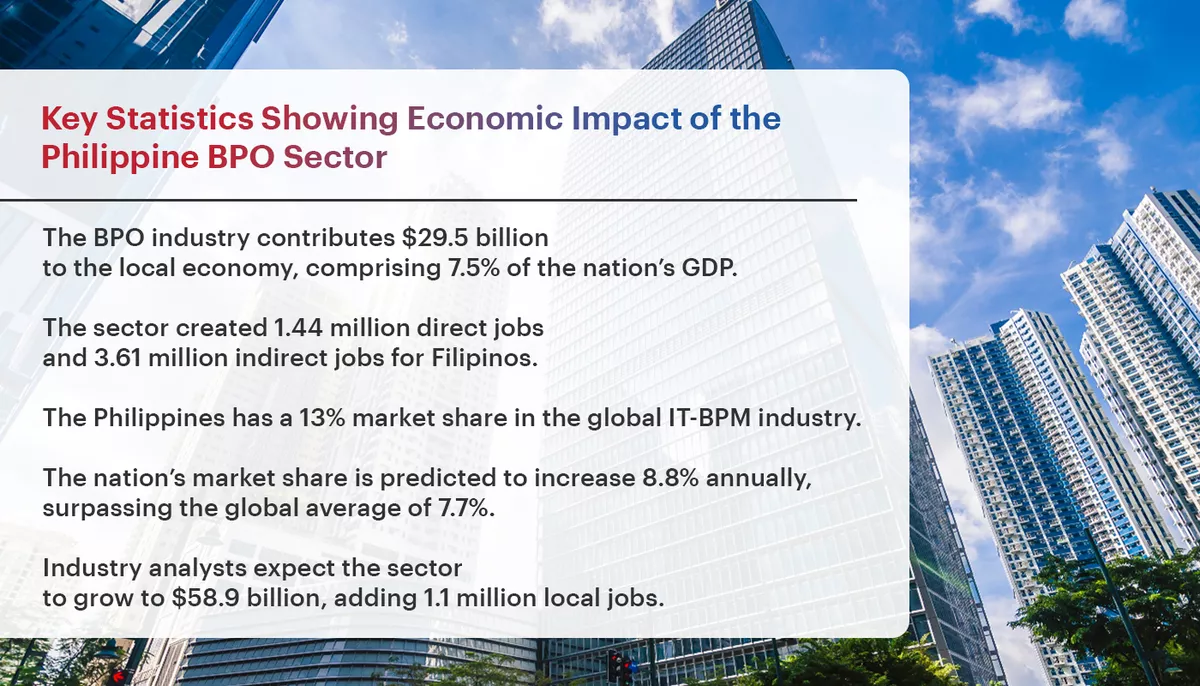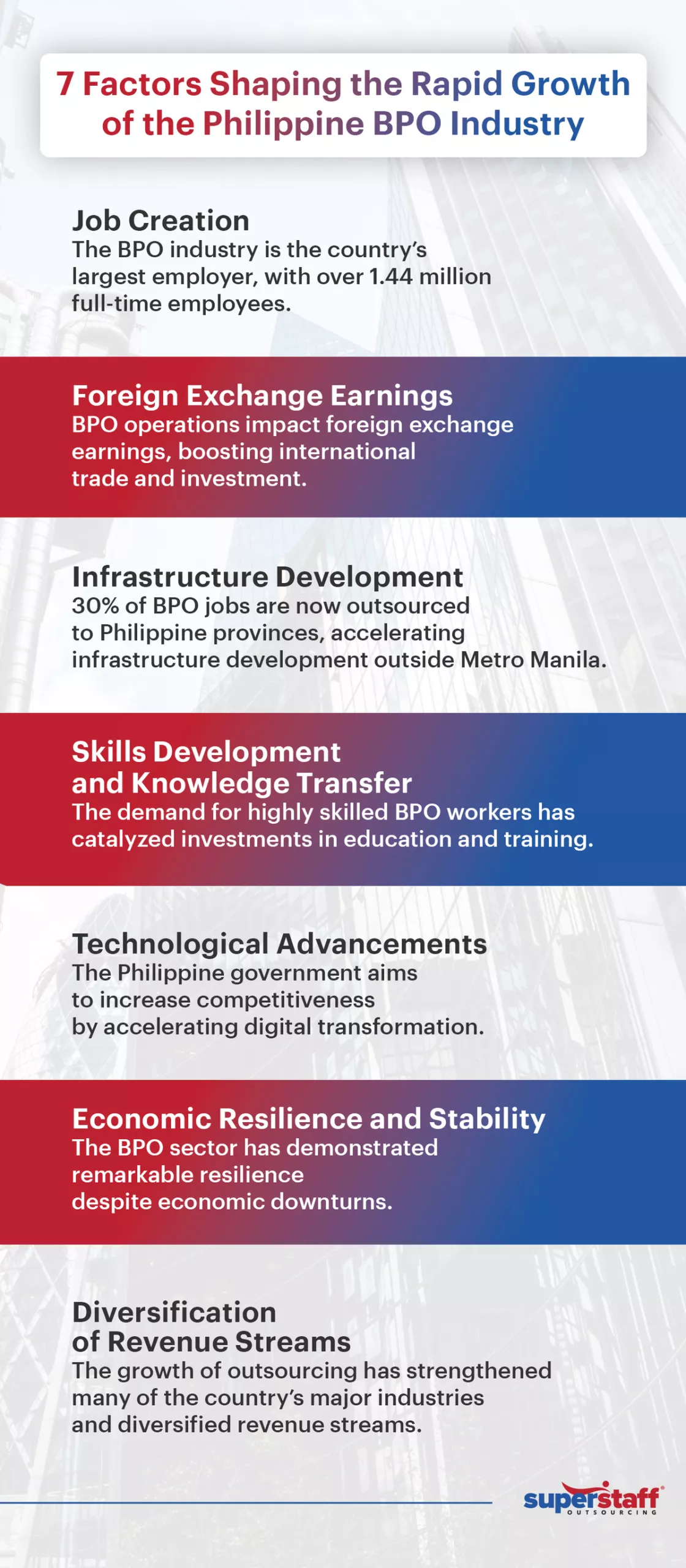


In the dynamic global business landscape, the Philippines is a powerhouse in the business process outsourcing (BPO) sector. The industry, which encompasses everything from customer support to IT solutions, has transformed how businesses operate and significantly influenced the country’s economic trajectory.
As talent shortages widen in the Western world, more Philippine outsourcing companies are stepping up to fill the gaps for employers. We can only imagine how the sector will expand in the coming years.
Compelling Statistics About the Philippines’ BPO Industry
Impact on the Local Economy
How big is the BPO industry in the Philippines? The outsourcing sector’s impact on the Philippine economy is undeniable.
According to the IT and Business Process Association of the Philippines (IBPAP), the sector contributes $29.1 billion in revenue to the local economy, comprising 7.5% of the nation’s GDP.
In addition to revitalizing the local economy, the outsourcing industry is among the country’s most prominent job generators. In 2021 alone, the sector created 1.44 million direct jobs and 3.61 million indirect jobs for Filipinos.
Global BPO Market Share
Beyond shaping the local economy and job market, BPO companies in the Philippines are also making waves worldwide. The country is known for being the second-largest service delivery location in the world.
The Philippines boasts a 13% market share in the global IT-BPM services industry and ranks first in voice-related services. The country’s BPO sector has excellent potential to gain an even bigger global market share. Analysts expect the industry to grow 8.8% annually, surpassing the global average rate of 7.7%.
Additionally, industry experts foresee the Philippine BPO industry increasing its GDP contribution from 7% to 8.4% in the coming years. In comparison, India, the country’s closest competitor in offshoring, only has a 3% to 4% market share in its economy.
Continued Upward Trajectory
As long as the Philippine government continues creating favorable policies, offering tax incentives, accelerating talent development, and making infrastructure investments, the country’s BPO sector will keep growing and expanding.
IBPAP’s research suggests that concerted efforts to improve the IT-BPM industry in the Philippines will help it achieve a CAGR of 5.5% in revenue and a 5.0% in headcount. By 2028, industry analysts expect the BPO sector to grow to $58.9 billion, adding over 1.1 million local jobs in the process.
Read More: A Glimpse Into the Past, Present, and Future Growth of the BPO Industry in the Philippines
The Outsourcing Revolution: Why BPO Is the Fastest-Growing Industry in the Philippines
Over the past few decades, the BPO industry in the Philippines has experienced exponential growth, becoming a vital component of the country’s economic engine. There’s a reason why outsourcing is the fastest-growing sector in the country. Here are a few of the factors shaping the industry’s rapid growth:
Job Creation and Employment Opportunities
The BPO sector has been a prolific creator of jobs for decades, employing millions of Filipinos across various skill levels. This surge in employment has not only reduced unemployment rates but has also elevated the standard of living for many.
As of 2022, the Philippine IT-BPO industry is considered the country’s largest employer, with over 1.44 million full-time employees.
With the rise of remote and hybrid work policies, initially triggered by the COVID-19 pandemic, outsourcing companies have since expanded their talent pool beyond Metro Manila, providing job opportunities for people in the provinces.
As such, industry experts predict that the BPO sector will continue leading the way in generating employment for Filipino workers nationwide.
Foreign Exchange Earnings
In the first half of 2022, the Philippine IT-BPM industry brought in $29 billion, surpassing its revenue targets. The profits generated from BPO operations have substantially impacted the country’s foreign exchange earnings, bolstering the Philippines’ economic stability and international trade and investment capacity.
Infrastructure and Urban Development
The growing demand for BPO services in the Philippines has led to significant investments in infrastructure, particularly in cities where BPO companies are concentrated. Government entities and private sectors have invested in developing office spaces, transportation, and other amenities contributing to urban advancement.
In the past, infrastructure developments were concentrated only in the Metro Manila area, particularly the business district of Makati City. However, today, outsourcing companies in the Philippines are realizing the vast potential of urban development in the provinces, helping widen employer talent pools and expand job opportunities to previously overlooked communities.
The National ICT Confederation of the Philippines (NICP) has led the charge in promoting countryside development. They are encouraging BPO employers to invest in already-known centers of excellence like Metro Manila and take a chance on so-called “Next Wave Cities,” such as Pampanga, Baguio, Dagupan, and Naga.
Their program has been a resounding success. As of 2022, the IBPAP estimates that about 30% of BPO jobs now take place in the Philippine provinces.
Skill Development and Knowledge Transfer
The demand for highly skilled workers in the BPO sector has catalyzed investments in education and training programs. As such, the Philippine workforce’s overall skill level has improved, benefitting the BPO industry and various other sectors.
Previously, the Philippine outsourcing sector focused on providing customer support and other call center services. However, the industry has expanded its outsourcing solutions to include non-voice services, omnichannel support, customer experience strategy, back-office roles, and even knowledge process outsourcing tasks like software development and data science.
Technological Advancements
The Philippine government has been actively working to increase the country’s competitiveness by accelerating digital transformation. Current and previous administrations have continued the Information and Communications Technology (ICT) programs, which aim to improve internet and mobile connectivity nationwide, boost software development for business enhancement, and invest in cybersecurity solutions.
Among the different sectors in the country, the BPO industry is once again a leading force in adopting and innovating its operations with new technologies. During the global pandemic, as other industries struggled to stay afloat, call centers and IT-BPO companies thrived due to their quick adoption of remote working technologies.
BPOs in the Philippines also accelerate efficiency by closely monitoring emerging technology trends, such as artificial intelligence and machine learning.
Economic Resilience and Stability
One of the most notable contributions of outsourcing companies to the Philippine economy is its role in providing stability and resilience, especially during times of global economic uncertainty. Despite economic downturns, the BPO sector has demonstrated remarkable resilience, providing a stable source of revenue and employment for millions of Filipinos.
In 2022, the Philippine BPO industry generated $32.5 billion in revenue, growing by 10.3% from the previous year. Beyond becoming a significant contributor to the country’s GDP, the sector has also established itself as a global outsourcing leader, catching the eye of foreign investors all over the world.
Diversification of Revenue Streams
The BPO industry has played a pivotal role in diversifying the Philippine economy. Traditionally reliant on agriculture and remittances from overseas Filipino workers, the BPO sector has added a new pillar of economic strength, reducing the country’s dependence on a limited range of industries.
The growth of outsourcing has also strengthened many of the country’s major industries and business services, such as telecommunications, real estate development, and e-commerce.
Embrace the Future of the BPO Industry in the Philippines
The Philippine BPO sector faces challenges such as evolving technology and global competition. However, its adaptability and continuous skills development within the workforce will undoubtedly fuel its sustained growth.
The BPO industry’s impact on the Philippine economy is nothing short of transformative. From job creation to infrastructure development, its influence resonates throughout the country. As the industry continues to evolve, its role in shaping the economic landscape of the Philippines will undoubtedly remain a topic of interest for economists, policymakers, and business leaders alike.
At SuperStaff, we’re ready to face the challenges and embrace the opportunities that come our way in 2023 and beyond. Our continually growing outsourcing company in the Philippines combines innovative solutions with people-centered policies, increasing our global competitiveness while providing invaluable job opportunities for Filipino workers.
Contact us today to learn more about our top-notch outsourcing services!






